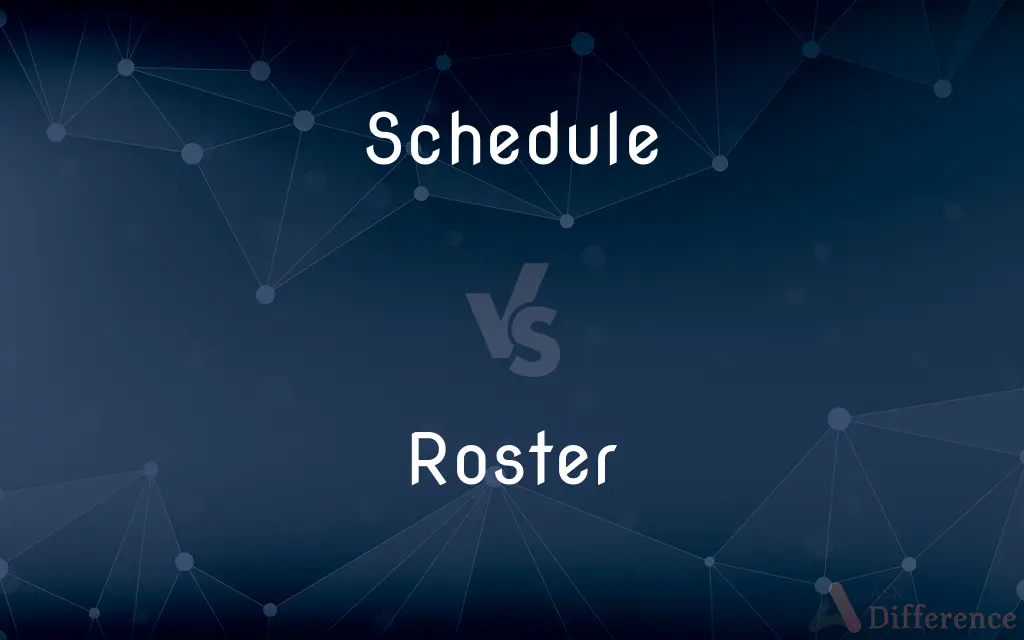Schedule vs. Roster — What's the Difference?
By Urooj Arif & Fiza Rafique — Updated on March 8, 2024
A schedule is a plan that outlines specific times for activities or events, focusing on when these will occur, while a roster lists names of people involved in a task or duty, detailing who is assigned to what.

Difference Between Schedule and Roster
Table of Contents
ADVERTISEMENT
Key Differences
Schedules are used across various contexts to organize time, specifying when certain tasks, appointments, or events will take place. They help individuals and organizations plan their activities efficiently, ensuring a clear understanding of upcoming commitments and their timing. For example, a business may have a schedule for meetings, project given-time, and presentations to manage its operations effectively. Conversely, a roster is specifically concerned with listing individuals or groups, assigning them to specific tasks, roles, or shifts. It is commonly used in workplaces to manage employee work hours, in sports to list team members, or in events to assign volunteers to different duties.
The creation of a schedule involves allocating specific times to activities, aiming to optimize the use of time and resources. It requires consideration of the duration of tasks, availability of resources, and potential conflicts to create a logical and efficient sequence of events. Rosters, however, focus on the allocation of personnel, ensuring that all necessary roles are covered. This involves balancing workloads, considering individuals' skills and preferences, and often rotating assignments to promote fairness and efficiency.
Schedules and rosters are tools for time and people management, respectively, but they often work together. For instance, a workplace might use a roster to determine which employees are working at any given time and a schedule to outline specific tasks those employees will undertake during their shifts. This demonstrates how schedules can detail the "when" of activities, while rosters focus on the "who" is responsible for them.
While schedules are versatile and can apply to personal, professional, or organizational activities, rosters are specifically tailored to manage people within teams, organizations, or events. The choice between using a schedule, a roster, or both depends on the need to organize time, assign individuals to specific roles or tasks, and ensure that all planned activities can be carried out effectively and efficiently.
Comparison Chart
Definition
A plan outlining specific times for activities or events
A list of names of people involved in a task or duty
ADVERTISEMENT
Primary Focus
When events or tasks will occur
Who is assigned to what task or role
Usage Context
Time management for personal, professional, organizational activities
People management in workplaces, teams, events
Key Components
Times, dates, durations of activities
Names, roles, shift times
Purpose
To optimize the use of time and resources
To ensure coverage and balance workloads
Compare with Definitions
Schedule
Schedules organize activities or events by time.
The conference schedule lists session times and locations.
Roster
Rosters assign specific people to tasks or duties.
The restaurant roster shows who works each shift this week.
Schedule
Helps prevent conflicts and overlaps in activities.
The appointment schedule avoids double-booking clients.
Roster
Aims to distribute tasks fairly among individuals or groups.
The volunteer roster rotates duties to share responsibilities.
Schedule
Ensures efficient use of time and resource allocation.
The production schedule optimizes machinery and labor use.
Roster
Takes into account individuals' skills and availability.
The event roster assigns tasks based on volunteers' preferences.
Schedule
Used to manage personal, professional, and organizational time.
My weekly schedule includes work, gym, and study times.
Roster
Ensures all necessary roles are covered.
The duty roster covers all positions 24/7 in the hospital.
Schedule
Can vary in scope from daily tasks to long-term projects.
The project schedule outlines milestones over six months.
Roster
Commonly used in workplaces, sports teams, and events.
The team roster lists all players and their positions.
Schedule
A schedule or a timetable, as a basic time-management tool, consists of a list of times at which possible tasks, events, or actions are intended to take place, or of a sequence of events in the chronological order in which such things are intended to take place. The process of creating a schedule — deciding how to order these tasks and how to commit resources between the variety of possible tasks — is called scheduling, and a person responsible for making a particular schedule may be called a scheduler.
Roster
A list, especially of the names of players on a sports team or of the personnel in a military unit.
Schedule
A plan for carrying out a process or procedure, giving lists of intended events and times
We have drawn up an engineering schedule
Roster
A list of individuals or groups, usually for an organization of some kind such as military officers and enlisted personnel enrolled in a particular unit; a muster roll; a sports team, with the names of players who are eligible to be placed in the lineup for a particular game; or a list of students officially enrolled in a school or class.
I'm number 12 on the roster for tonight's game.
Schedule
An appendix to a formal document or statute, especially as a list, table, or inventory
They need a clear schedule of fixtures and fittings
Roster
A list of the jobs to be done by members of an organization and often with the date/time that they are expected to do them.
The secretary has produced a new cleaning roster for the Church over the remainder of the year.
Schedule
(with reference to the British system of income tax) any of the forms (named ‘A’, ‘B’, etc.) issued for completion and relating to the various classes into which taxable income is divided.
Roster
A schedule or timetable setting out shift times and dates for each employee of a business.
Schedule
Arrange or plan (an event) to take place at a particular time
The release of the single is scheduled for April
Roster
(math) A bracketed list that shows the elements of a set.
Schedule
Include (a building or site) in a list for legal preservation or protection
Cowley Bridge has already been scheduled and protected as an ancient monument
Roster
(transitive) To place the name of (a person) on a roster.
I have rostered you for cleaning duties on the first Monday of each month.
Schedule
A list of times of departures and arrivals; a timetable
A bus schedule.
A schedule of guided tours.
Roster
To show the elements of a set by listing them inside brackets.
Schedule
A plan for performing work or achieving an objective, specifying the order and allotted time for each part
Finished the project on schedule.
Roster
A register or roll showing the order in which officers, enlisted men, companies, or regiments are called on to serve.
Schedule
A printed or written list of items in tabular form
A schedule of postal rates.
Roster
A list of names;
His name was struck off the rolls
Schedule
A program of events or appointments expected in a given time
Can you fit me into your schedule Tuesday afternoon?.
Schedule
A student's program of classes.
Schedule
A supplemental statement of details appended to a document.
Schedule
A federally regulated list of controlled substances, ranked in classes by potential for abuse.
Schedule
One of the ranks or classes in such a list.
Schedule
To enter on a schedule
Calculate and schedule each tax deduction on the proper form.
Schedule
To make up a schedule for
I haven't scheduled the coming week yet.
Schedule
To plan or appoint for a certain time or date
Scheduled a trip in June.
Was scheduled to arrive Monday.
Schedule
To list or rank (a controlled substance) in a schedule.
Schedule
(obsolete) A slip of paper; a short note.
Schedule
(legal) A written or printed table of information, often forming an annex or appendix to a statute or other regulatory instrument, or to a legal contract.
Schedule of tribes
Schedule
One of the five divisions into which controlled substances are classified, or the restrictions denoted by such classification.
A Schedule I drug with a high potential for abuse
Schedule
A serial record of items, systematically arranged.
Schedule
A procedural plan, usually but not necessarily tabular in nature, indicating a sequence of operations and the planned times at which those operations are to occur.
Stick to the schedule
We're running behind schedule
Things are happening ahead of schedule
Schedule
(computer science) An allocation or ordering of a set of tasks on one or several resources.
Schedule
To create a time-schedule.
Schedule
To plan an activity at a specific date or time in the future.
I'll schedule you for three-o'clock then.
The next elections are scheduled on the twentieth of November.
Schedule
To add a name to the list of people who are participating in something.
I am scheduled for classes next month.
Schedule
To admit (a person) to hospital as an involuntary patient under a schedule of the applicable mental health law.
Whether or not to schedule a patient
Schedule
(US) To classify as a controlled substance.
Schedule
A written or printed scroll or sheet of paper; a document; especially, a formal list or inventory; a list or catalogue annexed to a larger document, as to a will, a lease, a statute, etc.
Schedule
To form into, or place in, a schedule.
Schedule
A temporally organized plan for matters to be attended to
Schedule
An ordered list of times at which things are planned to occur
Schedule
Plan for an activity or event;
I've scheduled a concert next week
Schedule
Make a schedule; plan the time and place for events;
I scheduled an exam for this afternoon
Common Curiosities
Can schedules and rosters be used together?
Yes, schedules and rosters often work together, with schedules detailing when tasks will occur and rosters assigning who will carry them out.
How do I create an effective schedule?
To create an effective schedule, consider the tasks' priorities, duration, given-time, and any potential conflicts to ensure logical and efficient time allocation.
What is a roster?
A roster is a list that details individuals assigned to particular tasks or duties, focusing on managing who is responsible for what.
Why is a schedule important?
A schedule is important for organizing time, preventing conflicts, and ensuring that all necessary activities are completed efficiently.
Can a roster help in team management?
Yes, a roster is crucial for team management, as it assigns specific roles and responsibilities, ensuring efficient and effective task completion.
What is a schedule?
A schedule is a plan that outlines specific times at which activities or events are intended to occur, used for managing time efficiently.
What considerations are important when making a roster?
When making a roster, consider individuals' skills, preferences, and availability, as well as the need to balance workloads and ensure fair task distribution.
What makes a good roster?
A good roster fairly distributes tasks among team members, considers individual skills and availability, and ensures all necessary roles are covered.
How can schedules help in personal life?
In personal life, schedules can help manage time for various activities, such as work, leisure, and family time, enhancing productivity and balance.
How does a schedule differ from a calendar?
A schedule specifically outlines the timing of tasks or events, while a calendar provides an overview of dates, often including both scheduled activities and general information.
Share Your Discovery

Previous Comparison
Clarify vs. Purify
Next Comparison
Boost vs. BurstAuthor Spotlight
Written by
Urooj ArifUrooj is a skilled content writer at Ask Difference, known for her exceptional ability to simplify complex topics into engaging and informative content. With a passion for research and a flair for clear, concise writing, she consistently delivers articles that resonate with our diverse audience.
Co-written by
Fiza RafiqueFiza Rafique is a skilled content writer at AskDifference.com, where she meticulously refines and enhances written pieces. Drawing from her vast editorial expertise, Fiza ensures clarity, accuracy, and precision in every article. Passionate about language, she continually seeks to elevate the quality of content for readers worldwide.















































